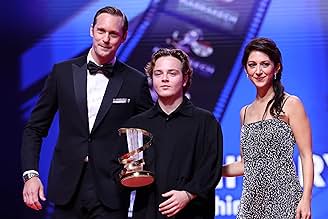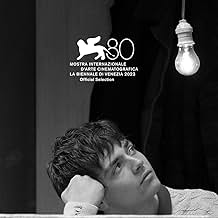PUNTUACIÓN EN IMDb
6,8/10
1,1 mil
TU PUNTUACIÓN
Ahmet, de catorce años, es enviado por su padre a un dormitorio religioso sólo para chicos, donde tiene que enfrentarse a las expectativas familiares, a sus obligaciones religiosas y a la in... Leer todoAhmet, de catorce años, es enviado por su padre a un dormitorio religioso sólo para chicos, donde tiene que enfrentarse a las expectativas familiares, a sus obligaciones religiosas y a la infancia a la que se aferra desesperadamente.Ahmet, de catorce años, es enviado por su padre a un dormitorio religioso sólo para chicos, donde tiene que enfrentarse a las expectativas familiares, a sus obligaciones religiosas y a la infancia a la que se aferra desesperadamente.
- Premios
- 15 premios y 26 nominaciones en total
Esila Ergun
- Little Girl
- (as Esila Ergün)
Reseñas destacadas
10Alper-72
Yurt is truly an impressive and thought-provoking piece. It masterfully narrates a child's struggle to find themselves within the constraints imposed by society. Nehir Tuna's direction, atmosphere, and storytelling are highly successful.
In particular, the scenes reflecting Ahmet's inner world deeply affected me. On one hand, he is caught between his father's and society's expectations, and on the other, he begins to question the rules after meeting a freer character like Hakan. This internal conflict is portrayed very realistically. The anxiety, helplessness, and curiosity in Ahmet's eyes were palpable in every scene.
The film's way of depicting the environment of the dormitory, the pressure, and how individuality is disregarded was quite striking. The dark and oppressive tones perfectly matched the story's atmosphere. In some scenes, I truly felt as if I were inside that environment.
Additionally, the film subtly weaves in elements of the political atmosphere of the era. Details like Sevinç's use of the word "Aczmendi" remind viewers of 1990s Turkey and its conservative structure. These elements are integrated into the narrative in a natural flow, without being overly blatant.
While watching this film, I couldn't help but put myself in Ahmet's shoes. His internal conflict, the obligation to conform, and the burgeoning desire for freedom all felt incredibly familiar to me.
Ahmet's growth in an environment trying to box him in-caught between the desire to belong and the need to be free-reminded me exactly of my own experiences. That silence, the waiting to be understood without saying anything, questioning whether he is doing the "right" thing with every move he makes...
I was reminded that courage is contagious, but it also comes with a cost. In the final scenes, Ahmet's eyes perhaps showed for the first time that he truly understood things. At that moment, Ahmet was no longer present; I was.
Hakan's fate and Ahmet's inner journey seem to be left for the audience's interpretation. For some, this might appear as an unresolved ending, yet I believe it makes the message the film aims to convey even stronger.
In conclusion, Yurt is not just a coming-of-age story, but a film that questions the impact of society on the individual. It is definitely one of those productions that should be watched.
In particular, the scenes reflecting Ahmet's inner world deeply affected me. On one hand, he is caught between his father's and society's expectations, and on the other, he begins to question the rules after meeting a freer character like Hakan. This internal conflict is portrayed very realistically. The anxiety, helplessness, and curiosity in Ahmet's eyes were palpable in every scene.
The film's way of depicting the environment of the dormitory, the pressure, and how individuality is disregarded was quite striking. The dark and oppressive tones perfectly matched the story's atmosphere. In some scenes, I truly felt as if I were inside that environment.
Additionally, the film subtly weaves in elements of the political atmosphere of the era. Details like Sevinç's use of the word "Aczmendi" remind viewers of 1990s Turkey and its conservative structure. These elements are integrated into the narrative in a natural flow, without being overly blatant.
While watching this film, I couldn't help but put myself in Ahmet's shoes. His internal conflict, the obligation to conform, and the burgeoning desire for freedom all felt incredibly familiar to me.
Ahmet's growth in an environment trying to box him in-caught between the desire to belong and the need to be free-reminded me exactly of my own experiences. That silence, the waiting to be understood without saying anything, questioning whether he is doing the "right" thing with every move he makes...
I was reminded that courage is contagious, but it also comes with a cost. In the final scenes, Ahmet's eyes perhaps showed for the first time that he truly understood things. At that moment, Ahmet was no longer present; I was.
Hakan's fate and Ahmet's inner journey seem to be left for the audience's interpretation. For some, this might appear as an unresolved ending, yet I believe it makes the message the film aims to convey even stronger.
In conclusion, Yurt is not just a coming-of-age story, but a film that questions the impact of society on the individual. It is definitely one of those productions that should be watched.
10By_ekizz
"Yurt" is one of the most quietly disturbing films I've seen in recent Turkish cinema.
It doesn't shout, it doesn't accuse - it simply watches.
What we see: a religious dormitory, modeled after the real-life.
What we feel: a subtle, almost invisible tension - the pressure to conform, to shrink, to obey.
The film never overstates its message. It trusts its audience.
It trusts us to recognize that these "disciplined" environments are actually machines - not for education, but for ideological shaping.
The scariest part? The best child is the one who speaks the least.
Yurt doesn't judge its characters, but it quietly exposes the system.
And that's what makes it powerful cinema.
This is a film that doesn't just disturb - it lingers.
It doesn't shout, it doesn't accuse - it simply watches.
What we see: a religious dormitory, modeled after the real-life.
What we feel: a subtle, almost invisible tension - the pressure to conform, to shrink, to obey.
The film never overstates its message. It trusts its audience.
It trusts us to recognize that these "disciplined" environments are actually machines - not for education, but for ideological shaping.
The scariest part? The best child is the one who speaks the least.
Yurt doesn't judge its characters, but it quietly exposes the system.
And that's what makes it powerful cinema.
This is a film that doesn't just disturb - it lingers.
Some films entertain, some impress, and a rare few reach directly into your life and show you a truth you hadn't yet found the words for. Yurt(The Dormitory), Nehir Tuna's hauntingly intimate debut, is one of those rare films. It is a quiet masterpiece-so precise in its storytelling, so understated in its emotion, and yet, somehow, so overwhelmingly powerful.
I watched Yurt and, for the first time in my life, felt as if a film had reached me not just as a viewer, but as a human being living through a particular place, time, and atmosphere. Every frame of this film breathes, pauses, and listens. It does not shout or beg to be noticed-it simply exists, fully and truthfully, in a way that feels more like memory than narrative.
The story follows a young boy sent to a religious dormitory, navigating the silence between belief and doubt, masculinity and vulnerability, discipline and desire. The setting-both literal and psychological-evokes suffocation, but never melodrama. Tuna's brilliance lies in his restraint. Instead of imposing judgment, he invites us to sit beside the boy, to see what he sees, feel what he feels, and above all, to remember.
Visually, the film is exquisite. The use of light and shadow is not just beautiful, but meaningful-it conveys everything that cannot be said aloud in this repressive environment. The color palette reflects the emotional state of its characters-faded, cold, sometimes harsh, sometimes warm enough to hint at the possibility of tenderness. Tuna has an exceptional eye, one that understands not only how to look, but when to look, and when to turn away.
What struck me most was how effortlessly the film communicated the complexity of growing up in a space where power, control, and religious ideology intertwine. There's no simplistic good vs. Evil here. Tuna treats each character-even the sternest authority figures-with a kind of compassionate distance. The dormitory itself becomes a metaphor for a society that demands conformity and punishes softness, but it's never reduced to just that. It's more than a symbol; it's a world-one many of us will find painfully familiar.
As someone who teaches a course on "Political Inclusion and Art" , It captures the nuances of our political and social reality without didacticism, without slogans, and with a depth that only great art can offer. It tells the story of a generation growing up under quiet, everyday pressures-expectations about who they should be, how they should feel, what they should believe. But it tells that story with care, patience, and immense artistic control.
Nehir Tuna is a filmmaker whose lens understands the youth of this country better than any political analysis. His gaze is not just observant, it is human. He does not dramatize suffering-he simply shows it, in its slow, real, and often invisible forms.
Thank you, Nehir Tuna, for making something so precise, so compassionate, and so needed. You've given us a story that lingers-and a silence that speaks louder than anything else.
I watched Yurt and, for the first time in my life, felt as if a film had reached me not just as a viewer, but as a human being living through a particular place, time, and atmosphere. Every frame of this film breathes, pauses, and listens. It does not shout or beg to be noticed-it simply exists, fully and truthfully, in a way that feels more like memory than narrative.
The story follows a young boy sent to a religious dormitory, navigating the silence between belief and doubt, masculinity and vulnerability, discipline and desire. The setting-both literal and psychological-evokes suffocation, but never melodrama. Tuna's brilliance lies in his restraint. Instead of imposing judgment, he invites us to sit beside the boy, to see what he sees, feel what he feels, and above all, to remember.
Visually, the film is exquisite. The use of light and shadow is not just beautiful, but meaningful-it conveys everything that cannot be said aloud in this repressive environment. The color palette reflects the emotional state of its characters-faded, cold, sometimes harsh, sometimes warm enough to hint at the possibility of tenderness. Tuna has an exceptional eye, one that understands not only how to look, but when to look, and when to turn away.
What struck me most was how effortlessly the film communicated the complexity of growing up in a space where power, control, and religious ideology intertwine. There's no simplistic good vs. Evil here. Tuna treats each character-even the sternest authority figures-with a kind of compassionate distance. The dormitory itself becomes a metaphor for a society that demands conformity and punishes softness, but it's never reduced to just that. It's more than a symbol; it's a world-one many of us will find painfully familiar.
As someone who teaches a course on "Political Inclusion and Art" , It captures the nuances of our political and social reality without didacticism, without slogans, and with a depth that only great art can offer. It tells the story of a generation growing up under quiet, everyday pressures-expectations about who they should be, how they should feel, what they should believe. But it tells that story with care, patience, and immense artistic control.
Nehir Tuna is a filmmaker whose lens understands the youth of this country better than any political analysis. His gaze is not just observant, it is human. He does not dramatize suffering-he simply shows it, in its slow, real, and often invisible forms.
Thank you, Nehir Tuna, for making something so precise, so compassionate, and so needed. You've given us a story that lingers-and a silence that speaks louder than anything else.
I found this film to be exceptionally well-made. From the actors to the scenes, everything evoked a sense of nostalgia. The realism was top-notch. In my opinion, it beautifully portrayed the struggles of a child torn between Kemalism and Islam. It captured the essence of being caught in the middle, feeling trapped, with remarkable accuracy. These aspects were all very valuable. I was particularly struck by the line, "Who is greater, Allah or Atatürk?" I believe it was a significant statement.
Moreover, the film sheds light on the intense impact of religion and nationalism on children in Turkey, often unnoticed by society. This depiction of children feeling trapped between these powerful forces makes it a crucial piece of work. I hope it reaches a wide audience and that everyone has the chance to see it.
Moreover, the film sheds light on the intense impact of religion and nationalism on children in Turkey, often unnoticed by society. This depiction of children feeling trapped between these powerful forces makes it a crucial piece of work. I hope it reaches a wide audience and that everyone has the chance to see it.
The movie makes us watch the panorama of Türkiye in the 90s. This panorama is so narrow, so cramped that it looks like it is inside a dormitory. Ahmet and Hakan are stuck like each of us, looking for freedom. There were parts where I watched with bated breath. Spoiler: The only part I couldn't understand was what was Ahmet's father's motivation for a radical change? Would it make a big difference if the movie showed us this? I don't think so. Definitely a must watch. The movie Yurt reminded me of this quote. "Yours is not despair, it's boredom. Everyone alive has hope." Everyone alive has hope. No matter what our choices are. Just like the action of running away, which Ahmet sees as a last resort.
¿Sabías que...?
- CuriosidadesYURT is a Turkish-German-French co-production.
Selecciones populares
Inicia sesión para calificar y añadir a tu lista para recibir recomendaciones personalizadas
- How long is Dormitory?Con tecnología de Alexa
Detalles
- Fecha de lanzamiento
- Países de origen
- Sitio oficial
- Idioma
- Títulos en diferentes países
- 你看見青春的顏色嗎
- Localizaciones del rodaje
- Empresas productoras
- Ver más compañías en los créditos en IMDbPro
Taquilla
- Recaudación en todo el mundo
- 86.322 US$
- Duración
- 1h 56min(116 min)
- Color
Contribuir a esta página
Sugerir un cambio o añadir el contenido que falta




















